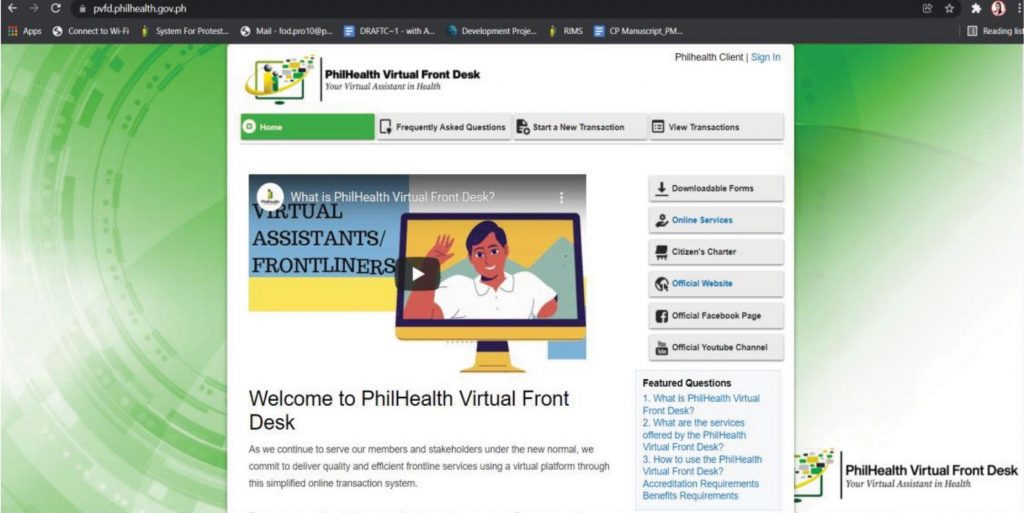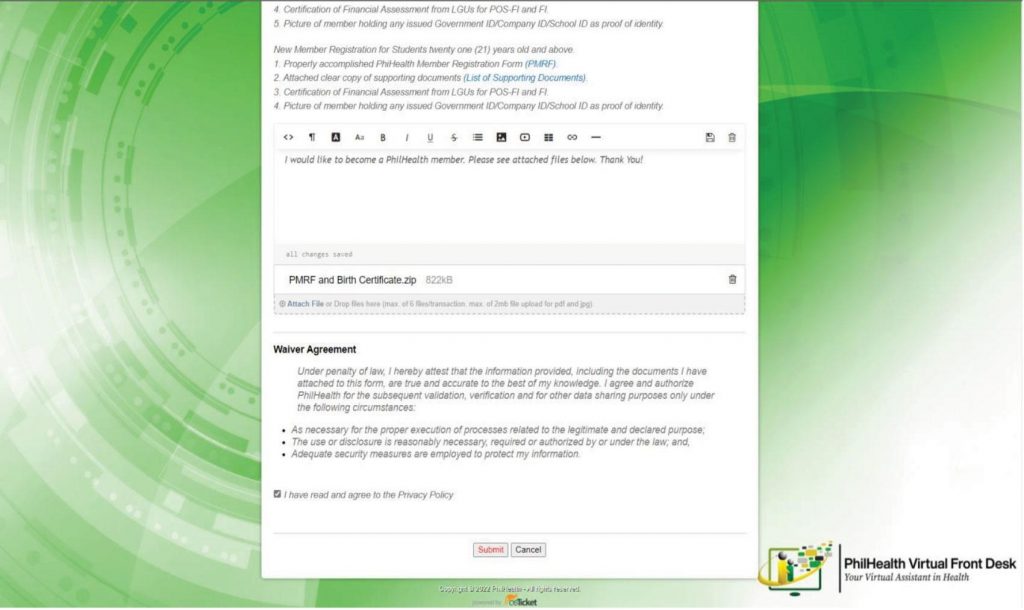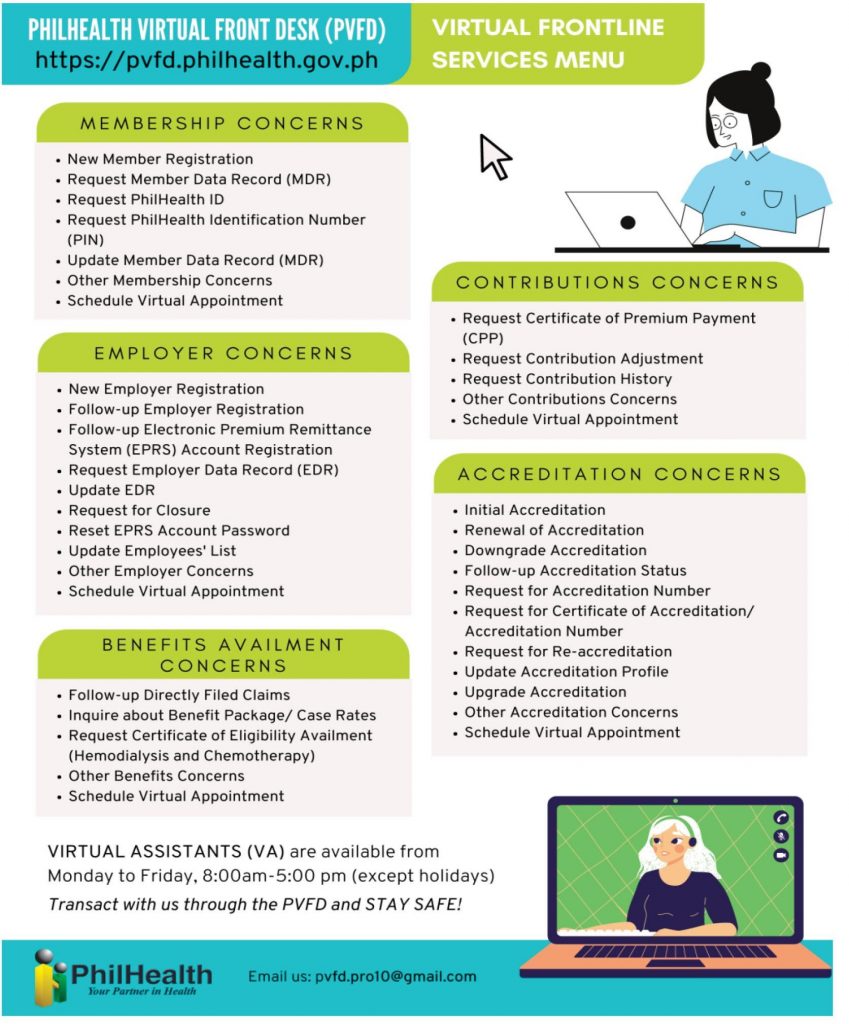Themes
e-Government: The PhilHealth Virtual Front Desk (PVFD) effectively uses information and communication technologies to improve the productivity and accessibility of public-sector services. By providing an alternative to traditional, paper-based registration processes, the PVFD enhances service quality through continuous improvements and ensures that services are more efficient and effective.
Innovation Leadership: Introduces a digital solution that influences and improves the accomplishment of public tasks, making essential healthcare services more accessible.
Overview
The PVFD centers on creating an alternative touchpoint for membership registration and service access, which was crucial especially during the pandemic. The main challenge was ensuring continuous and efficient service delivery without requiring physical visits to Local Health Insurance Offices (LHIO). The solution was the deployment of PVFD, leveraging ICT to provide a convenient, accessible platform for users to conduct transactions online. This addressed the immediate need for safety and convenience, supporting universal health care goals and enhancing PhilHealth’s responsiveness to evolving public service requirements.
Challenge
The PVFD addresses the challenge of low membership registration rates, exacerbated by limited registration mechanisms during the pandemic. Based on a report from PhilHealth’s Member Management Group as of 31 May 2021, the membership registration rate nationwide is 84%, while Region X is only 82%. Cagayan de Oro City’s registration rate is slightly higher at 85.8%. For CY 2021, PhilHealth’s management has set the membership registration target to 90% of the population across all regions, as provided in its Office Performance Scorecard (OPS). This indicates that for Cagayan de Oro City, PRO X still needs to register an additional 31,563 individuals from June to December 2021 to achieve the annual target.[1] [2] Despite the government’s commitment to universal health coverage, a significant portion of the population remains unregistered, which hampers their ability to promptly avail of PhilHealth benefits. The traditional registration process is primarily paper-based and requires physical visits to PhilHealth offices. The turnaround time (TAT) ranges from 3 to 5 minutes from the moment clients are attended by frontline staff (excluding queueing time at LHIOs). This requirement poses challenges for some PhilHealth members, particularly those who are handicapped or ill, ultimately resulting in reduced access to essential healthcare services as they struggle to register or update their membership.[3] [4] The challenge is further compounded by the need to align PhilHealth’s service delivery with the new normal, where digital and remote transactions have become more critical. NCR North BranchManager Mae R. Dizon shares her perspectives on the difficulties encountered during lockdowns, especially in maintaining frontline services for PhilHealth members.Based on a report from PhilHealth’s Member Management Group as of May 31, 2021, the membership registration rate nationwide is 84% while Region X is only 82%. For Cagayan de Oro City, the registration rate is slightly higher at 85.8%. For CY 2021, PhilHealth’s management has set the membership registration target to 90% of the population across all regions as provided in its Office Performance11Scorecard (OPS). This indicates that for Cagayan de Oro City, PRO X still needs to register an additional 31,563 individuals for the period June to December 2021 to achieve the annual target.
The traditional registration process is primarily paper-based and requires physical visits to PhilHealth offices, with a Turnaround Time (TAT) ranging from 3 to 5 minutes from the moment clients are attended by frontline staff (excluding queueing time at LHIOs). This requirement poses challenges for some PhilHealth members, particularly those who are handicapped or ill, ultimately resulting in reduced access to essential healthcare services as they struggle to register or update their membership.
Solution/s
This online platform provides PhilHealth members safe access to its services, enhancing client touchpoints and ensuring efficient transactions anytime, anywhere. Innovative features include a user-friendly interface, digital document submission, and real-time assistance, which streamline the registration process and reduce the need for physical visits. By leveraging ICT, the Virtual Public Assistance Desk ensures compliance with health protocols and addresses the digital divide with support for free public Wi-Fi, significantly improving accessibility. Members of the PhilHealth Head Office ITMD Team and PVFD support providers, Nelson de Vera and Jocelyn Pablo provided their insights into the strong security mechanisms built into their system to provide a secure user experience.
Member-Initiated and Assisted Registration Process: Enables individuals to initiate their PhilHealth membership registration online with assistance from virtual assistants. This is in contrast to the traditional unassisted online systems. Unlike purely automated systems, the VPAD provides real-time help from trained assistants, improving the registration experience and reducing errors.

Centralized Online Platform: Serves as a single gateway for all PhilHealth registration-related activities, consolidating various processes and documents in one place. This reduces the need for multiple physical visits or interactions with different PhilHealth offices. Users can access the platform from anywhere with an internet connection, significantly improving accessibility, especially in rural areas.

Real-Time Document Upload and Verification: Allows users to upload required documents in real-time, which can then be immediately verified by the virtual assistants. Users receive immediate confirmation and guidance if documents need corrections or additional submissions, speeding up the registration process. This eliminates delays associated with mailing or physically submitting documents.

Data Security and Privacy Measures: Enhanced data security protocols are implemented to protect users’ personal information during the registration process. This utilizes encryption and secure data storage practices, addressing concerns over data breaches and unauthorized access that were prevalent with previous email-based systems, which ensure adherence to national and international data protection laws, building trust among users.
Integration with Existing PhilHealth IT Systems: Integrates seamlessly with existing PhilHealth IT systems like the PhilHealth Website and Member Portal. This ensures that data flows smoothly between different PhilHealth services, reducing redundancy and improving efficiency. Iann Acutina, Head of ARTA Compliance Team and PVFD BPO, conveyed how PVFD is aligned with ARTA’s objectives and improves PhilHealth’s internal operations and ease of doing business by utilizing its framework.
User Feedback and Continuous Improvement Mechanism:Incorporates a feedback mechanism that allows users to rate their experience and suggest improvements. This regular feedback helps identify issues and areas for improvement, allowing for continuous enhancements to the platform.

Information, Education and Communication Activities: Strategic marketing ensures that a broader audience is aware of the new service, promoting higher registration rates. These informative campaigns help educate the public on how to use the platform effectively, reducing barriers to adoption.

Productivity Gains, Outcomes, and Impact
Following its initial deployment in November 2021 in PhilHealth Regional Office (PRO) X, the system expanded to all PROs in Mindanao by January 2022. Within the first fourteen months, the PVFD successfully processed 27,246 tickets, with 99.02% related to membership transactions. This figure rose to 29,929 tickets by March 2023. Membership transactions, particularly new member registrations, accounted for 85% of all PVFD tickets, indicating the system’s substantial impact on streamlining these services. Additionally, the PVFD attracted 18,573 users nationwide by April 2023, a 682% increase from April 2022. This surge in user adoption is attributed to extensive marketing and information dissemination campaigns by the Mindanao PROs.
The system’s usability and effectiveness were underscored by user feedback: 80.8% rated the PVFD as “Excellent” for ease of use, and 77.9% rated the Virtual Assistant services as “Excellent.” Despite some areas needing improvement, overall client satisfaction remained high, with 92.3% of respondents expressing satisfaction with their PVFD experience. The platform’s capacity to handle increased traffic during peak periods, such as April and May 2022, due to the Department of Health’s requirements for student medical insurance, demonstrated its robustness and efficiency.
The collaborative efforts among various PhilHealth offices and the consistent monitoring and adjustment of tasks via weekly meetings and a Trello Board contributed to the project’s success. This coordination ensured that the team members stayed focused on their deliverables while managing their primary responsibilities, leading to timely system enhancements and nationwide deployment readiness. The measurable productivity gains from the PVFD project illustrate its efficacy in improving service delivery, enhancing user experience, and supporting PhilHealth’s commitment to innovation and responsive public service. Walter Bacareza, the Area VP for Luzon and NCR and a PVFD Champion believes in cultivating an innovative environment and creating a safe space for creativity among its staff to enable PhilHealth to pave the way for innovative solutions that will benefit its members and contribute to the advancement of healthcare in the country.
Lessons Learned/Challenges in Implementing the Intervention
One major lesson learned for the implementation of PVFD is the importance of citizen participation and collaboration with key stakeholders in developing sustainable innovations. This ensured that the PVFD was relevant and responsive to user needs. However, challenges arose in areas such as IT infrastructure, policy updates, and human resource competitiveness. These challenges underscored the necessity for PhilHealth to continuously review and enhance its systems and policies to keep pace with changing demands. The PVFD’s deployment demonstrated the value of leveraging information and communications technology to provide a safe and convenient alternative for accessing PhilHealth services, especially amid pandemic restrictions. Nonetheless, the need for better integration and interoperability of database systems became evident to avoid redundancy and minimize turnaround times. Additionally, ensuring data privacy and managing potential fraudulent transactions were identified as critical areas requiring robust policies and ongoing vigilance. For sustainability, creating a dedicated Virtual Frontline Unit, investing in more effective web application development software, and continuous training for Virtual Assistants were recommended. By addressing these areas, PhilHealth can enhance the effectiveness and sustainability of the PVFD, ultimately supporting the broader goals of universal health care and streamlined government services. Gregorio C. Rulloda, the Area VP for Mindanao and a PVFD champion, shares the significance of securing management support from the outset to avoid challenges later on and ensure the smooth implementation of initiatives.
